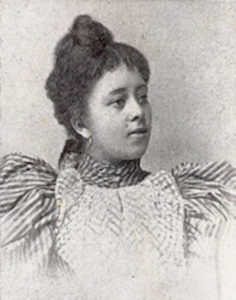
Lutie Lytle
*Lutie A. Lytle was born on this date in 1875. She was a Black lawyer and teacher.
Lutie A. Lytle was born in Murfreesboro, Tennessee, one of six surviving children of John R. and Mary Ann "Mollie" (Chesebro) Lytle, both formerly enslaved people. In 1882, the Lytle family moved to Topeka, Kansas. Lutie Lytle attended local Topeka schools and graduated from Topeka High School, where she was an "apt pupil." A contemporary account states that John Lytle, "an ardent worker in politics," while not asking for any favors for himself, "began to direct his influence toward obtaining something good for her."
When the Populist Party swept into power in Kansas in 1891, sixteen-year-old Lutie Lytle was appointed enrolling assistant clerk for the Kansas Populist-controlled legislature. While working in the legislature, contributing articles to the local black newspaper, and working as a compositor in the newspaper's printing plant, Lutie Lytle began to dream of higher goals. As she said later, "I read the newspaper exchanges a great deal and became impressed with the knowledge that my own people especially were the victims of legal ignorance. I resolved to fathom its depths and penetrate its mysteries and intricacies in hopes of being a benefit to my people."
Saving money, Lytle went to Chattanooga, Tennessee, and taught school. Lytle enrolled in the "law course" at Central Tennessee College. In 1897, she graduated as valedictorian. "Besides the graduation certificate, she received a diploma licensing her to practice before any of the courts in Tennessee. Upon admission, Lytle became the first female to the Tennessee State Bar. In September 1897, Lutie returned to Topeka, becoming the first black woman to practice law in Kansas.
Although contemporary reports describe Lutie Lytle as the first black woman lawyer in the United States, it appears that she was probably the third, preceded by Charlotte E. Ray and Mary Ann Shadd Cary. However, at the time of Lytle's admission to the Tennessee and Kansas state bars, Ray had left the practice of law, and Shadd Cary had died. In 1898, she returned to Central Tennessee College as a law school faculty member and a librarian. She stayed for one session through the spring of 1899.
After leaving Nashville, Lutie Lytle returned to Kansas, where she traveled about "delivering lectures on "Marriage and Divorce." In 1900, Lutie Lytle was teaching school in Pittsburgh, Pennsylvania. The following year, on January 2, 1901, in Pittsburgh, she married Alfred C. Cowan, a black lawyer with offices at 220 Broadway in New York City. Lutie Lytle-Cowan was admitted to the New York State Bar and joined her husband's practice.
She married the Reverend Stephen Alexander McNeill on July 10, 1916. After his sudden death in September 1913, she took over his practice and continued as a sole practitioner. She continued to be a lecturer, returned to Topeka in 1925, and addressed a large audience at St. John's A.M.E. Church, which she had attended in her youth.
Lytle told her audience about the progress of African Americans in New York City. She shared examples of integration in the schools and government and said of the vision of Marcus Garvey, considered the father of contemporary Black Nationalism. McNeil died in 1934. She continued to be involved in local politics until her death on November 12, 1955.
